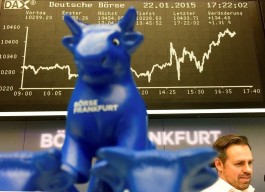A report prepared by the American Forbes magazine confirmed that oil prices tend to rise strongly, noting that some who were betting that the price of oil reached $ 30 a barrel completely stopped these expectations.
The report pointed out that since the beginning of this year, prices began to achieve tangible price gains, so that it gained 25% during the first two weeks of this year, and this did not happen because of suddenly high global demand, nor because of the large number of American rigs, or Due to the reduction in Canadian oil production.
The report attributed the reason for the recent price gains in the market mainly to the agreement to cut production, after OPEC producers decided to implement the agreement with good conformity from the beginning of this year.
He added that the January 1 OPEC announcement to reduce the volume of its exports by 1.2 million barrels per day pushed prices to move up once the reductions were applied.
The report explained that the second reason for the rise in prices is Saudi Arabia's announcement that it plans to gradually reduce production.
He pointed out that it is the only country in the world that has high production flexibility and the ability to significantly increase and reduce its oil production in a short period of time.
He added, that along the same lines, no other group of oil producing countries has the ability to lead the market like the OPEC group.
The report pointed out that the OPEC producer alliance is making record increases in production and export over the second half of last year, in preparation for anticipation of strict US sanctions against Iran.
The report pointed out that the decision taken by the administration of US President Donald Trump at the last minute, which provides for granting exemptions to China, India and six other countries to overturn the balances in the market, and lead to a decline in prices.
It is noteworthy that the previous and expected gains in prices mainly come from the positive effects of production cuts in the OPEC producer alliance, in addition to the good voluntary cuts implemented by Saudi Arabia, and the repercussions of the sanctions on Iran and Venezuela.





































